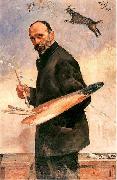Julian Falat Olja Måleriet ReproduceringAll Julian Falat Oil Paintings(30 July 1853 in Tuligłowy near Lwew - 9 July 1929 in Bystra Śląska) was one of the most prolific Polish painters of watercolor and one of the country's foremost landscape painters as well as one of the leading Polish impressionists. Fałat first studied under Władysław Łuszczkiewicz at the Krakew School of Fine Arts, and then at the Art Academy of Munich. After several trips throughout Europe and Asia in 1885, Fałat compiled a collection of studies from his voyages which would become useful later in the development of his artwork. Themes typical of Fałat's painting are Polish landscapes, hunting scenes, portraits, and studies from his voyages. In 1886, Fałat accepted an invitation from future German Emperor Wilhelm II to serve as court painter in Berlin. Fałat died in Bystra Śląska on July 9, 1929. A museum in Poland, called Fałatewka, is devoted to him. Out of his three children, Kazimierz (Togo) (1904-1981) continued to paint in watercolour. Some works, having been looted under German occupation, very occasionally reappear in sales-rooms. Later works, produced after he settled in England, are largely in the hands of his later family. |
|||

|
|||
|
|
|||
|
||||||||
| Julian Falat (30 July 1853 in Tuligłowy near Lwew - 9 July 1929 in Bystra Śląska) was one of the most prolific Polish painters of watercolor and one of the country's foremost landscape painters as well as one of the leading Polish impressionists. Fałat first studied under Władysław Łuszczkiewicz at the Krakew School of Fine Arts, and then at the Art Academy of Munich. After several trips throughout Europe and Asia in 1885, Fałat compiled a collection of studies from his voyages which would become useful later in the development of his artwork. Themes typical of Fałat's painting are Polish landscapes, hunting scenes, portraits, and studies from his voyages. In 1886, Fałat accepted an invitation from future German Emperor Wilhelm II to serve as court painter in Berlin. Fałat died in Bystra Śląska on July 9, 1929. A museum in Poland, called Fałatewka, is devoted to him. Out of his three children, Kazimierz (Togo) (1904-1981) continued to paint in watercolour. Some works, having been looted under German occupation, very occasionally reappear in sales-rooms. Later works, produced after he settled in England, are largely in the hands of his later family. |
||||||||
|
|
||||||||
| Måleriet Identifieringen :: 74576 Hunters' rest in forest 1889;. oil on canvas, 58 x 119 cm. cjr |
||||||||
|
|
||||||||
| Måleriet Identifieringen :: 74590 Elk oil on canvas, 96 x 192 cm. 1899 cjr |
||||||||
|
|
||||||||
| Måleriet Identifieringen :: 74591 Self-portrait from palette Oil on canvas, 135,5 x 86 cm. 1896 cjr |
||||||||
|
|
||||||||
| Måleriet Identifieringen :: 86037 Self-portrait. Date 1903 Medium Oil on canvas Dimensions 47.5 x 132.5 cm (18.7 x 52.2 in) cjr |
||||||||
|
|
||||||||
| Måleriet Identifieringen :: 97878 Self portrait 1903 Medium oil on canvas Dimensions 47.5 x 132.5 cm cyf |
||||||||
|
|
||||||||
| FÖREGÅENDE KONSTNÄR Nästa Konstnär | ||||||||
|
|
||||||||
|
Julian Falat (30 July 1853 in Tuligłowy near Lwew - 9 July 1929 in Bystra Śląska) was one of the most prolific Polish painters of watercolor and one of the country's foremost landscape painters as well as one of the leading Polish impressionists. Fałat first studied under Władysław Łuszczkiewicz at the Krakew School of Fine Arts, and then at the Art Academy of Munich. After several trips throughout Europe and Asia in 1885, Fałat compiled a collection of studies from his voyages which would become useful later in the development of his artwork. Themes typical of Fałat's painting are Polish landscapes, hunting scenes, portraits, and studies from his voyages. In 1886, Fałat accepted an invitation from future German Emperor Wilhelm II to serve as court painter in Berlin. Fałat died in Bystra Śląska on July 9, 1929. A museum in Poland, called Fałatewka, is devoted to him. Out of his three children, Kazimierz (Togo) (1904-1981) continued to paint in watercolour. Some works, having been looted under German occupation, very occasionally reappear in sales-rooms. Later works, produced after he settled in England, are largely in the hands of his later family. |
||||||||
|
|
||||||||
|
KOMMA I KONTAKT MED Oss |










